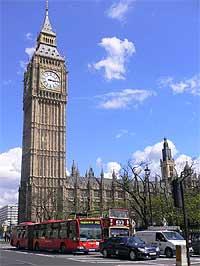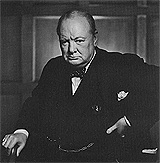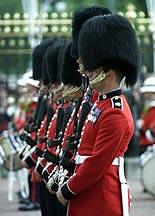' For Englishmen to boast of generation,
Cancels their knowledge, and lampoons the nation.
A true-born Englishman's a contradiction,
In speech an irony, in fact a fiction
.'- Daniel Defoe, The True Born Englishman
An interesting debate is currently going on in the British press, engendered by Max Hastings of The Guardian . Passionately arguing that "history is the story of the dominance", Hastings urged the British public to bravely embrace the British Isles as "the land of Drakes and Pepys" through the teaching of history . This has prompted a reader to remind Hastings not to cherish solely the great battle at Waterloo, but also to delve into the atrocity committed at Peterloo.
Meanwhile, Gordon Brown, salivating profusely while waiting to be crowned as prime minister before the next election, has called for a national day to be designated on which all Brits could proudly display their collective Britishness. In other worlds, a British answer to July 4 and Bastille Day.
If Tony Blair does step down and clears the way for his Chancellor to take over the top job, Brown will be the first Labour prime minister of Scottish origin since Ramsay MacDonald in the 1930s. Some interpret his surprise patriotism game as a cautious move to stem the trend of excessive Scottish nationalism, and his defence of British identity simultaneously a defence of his right to be the leader of all Britons.
I simply couldn't help remembering the verse "rebellious Scots to crush" in God save the King , last sung in the 1800s and long abandoned by those who are anxious to pretend that it never existed in the national anthem. Anyway, Brown should be commended for his effort to create an inclusive notion of Britishness, although what it entails will continue to be an issue hotly contested and debated in the months to come.
As far as I am concerned, my first pair of contact lenses came from Dollond & Aitchison, a UK eye-care chain founded by a Frenchman in 1750. If you happen to shop at the Marks & Spencer outlet in KLCC, a smidgeon of history will reveal that the now world-famous store has its humble origin in a Leeds-based Jewish family. Its catchy slogan 'Don't ask the price it's a penny', became an instant success in the 1880s. (So, never underestimate the prospects of the RM2 shops that dot many of the Malaysian towns today.)
Romans responsible
 Throughout my sojourning years in London, I had often to entertain the incessant grumbling of my friends from Taiwan and mainland China that the Big Smoke was too diversely benevolent, evidenced by the presence of the myriad ethnic communities, making the great metropolis rather "un-English". Some of them, in their earnest search of the "authentic England", eventually moved out of the capital and found transient shelter in some small towns in the country during summertime. Only then did I realise the omnipotence of cultural Occidentalism.
Throughout my sojourning years in London, I had often to entertain the incessant grumbling of my friends from Taiwan and mainland China that the Big Smoke was too diversely benevolent, evidenced by the presence of the myriad ethnic communities, making the great metropolis rather "un-English". Some of them, in their earnest search of the "authentic England", eventually moved out of the capital and found transient shelter in some small towns in the country during summertime. Only then did I realise the omnipotence of cultural Occidentalism.
While the romantic imagination of Shangri La has been holding many a Western soul captive for decades, the Chinese, intoxicated by a tiny dosage of postcolonialistic sentiments, may find the heterogeneous communities in some of the European cities an eyesore rather than a boon. Paradoxes abound even in a rapidly globalising world. But is there really such thing as authenticity?
As George Orwell succinctly puts it, we have a hunger for something like authenticity, but are easily satisfied by an ersatz facsimile. Take England for example. Even an apologist for imperialism like Rudyard Kipling cannot deny the hybridity of its history, as he readily acknowledged that the country's first major civilisation took shape after the arrival of the Romans.
 A true-blue Englishman may lose no time in telling the European that it was Winston Churchill, touted to be the greatest Englishman in living memory, who rescued the Continent from the atrocious Germans, and developed a post-World War II English identity against Germany. One can be easily oblivious to or ignorant of the fact that the Angles migrated from Denmark and the Saxons fled their ancestral land of the nowadays Lower Saxony.
A true-blue Englishman may lose no time in telling the European that it was Winston Churchill, touted to be the greatest Englishman in living memory, who rescued the Continent from the atrocious Germans, and developed a post-World War II English identity against Germany. One can be easily oblivious to or ignorant of the fact that the Angles migrated from Denmark and the Saxons fled their ancestral land of the nowadays Lower Saxony.
And there is no purity to speak of when it comes to the lineage of the British royalties. I never cease to be fascinated by the dome roof and the terra cotta frieze of the Royal Albert Hall, but the renowned English arts venue that adorns London is the brainchild of a German royal Prince Albert of Saxe-Coburg and Gotha, who had landed on English soil to marry Queen Victoria, herself almost purely German. The Queen, while ruling over a mass empire, did speak German with her consort at home.
Cornwall, the southwestern-most tip of England, is a picturesque province blessed with pristine natural beauty and steeped in history. It was once inhabited by the Cornish, who were famous for their mining expertise. Its Celtic tongue, Cornish, is vastly different from English and efforts have been made to revive it over the last two decades, to some admirable success.
Chinese takeaway
I would of course be happy to count the Devonshire cream tea, my all-time favourite pastime while in England, as among the greatest legacies bequeathed by the provincial monks, but, excuse me for sounding a bit chauvinist, would there be any afternoon tea if there had been no tea trade with China three centuries back?
I remember The Sun , the UK"s best-selling tabloid, going hysterical when British actress Marianne Jean-Baptiste remarked that curry had replaced fish and chips as the national dish. Yet the popularity of Indian cuisine does indicate the considerable success of multiculturalism in Britain.
 When I first went to London 16 years ago, fresh chilies (cili padi) and coriander were still a rarity in either Sainsbury's or Tesco (another British-Jewish enterprise). Today, they are indispensable in many of the British restaurants, and Jamie Oliver loves to demonstrate this embrace of exotic ingredients in his Naked Chef television shows.
When I first went to London 16 years ago, fresh chilies (cili padi) and coriander were still a rarity in either Sainsbury's or Tesco (another British-Jewish enterprise). Today, they are indispensable in many of the British restaurants, and Jamie Oliver loves to demonstrate this embrace of exotic ingredients in his Naked Chef television shows.
All this only leads to the conclusion that Britain continues to evolve and adopt in terms of its identity, and the recent debate on the issue by the press and the politicians will no doubt broaden public understanding of the wealth of cultures that the country has come to celebrate and enjoy.
As for me, it is rather amusing that my Chinese friends remain enthralled by the myth of an authentic England. Many of them, having gone to the English countryside, only find themselves earning a living by working in Chinese restaurants, gazing out the window, lost in the English scenery outside.
To me, nothing is more ironic than this. After all, in one's infatuation with the England myth, there should not have been a Chinese takeaway in the first place.

